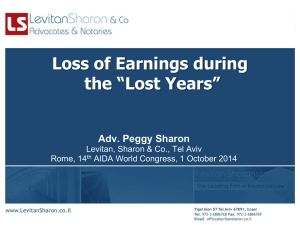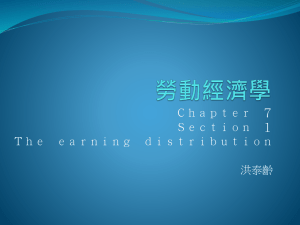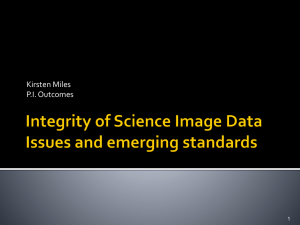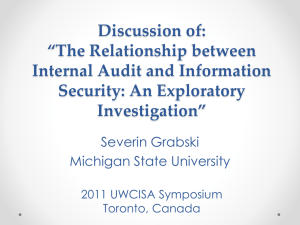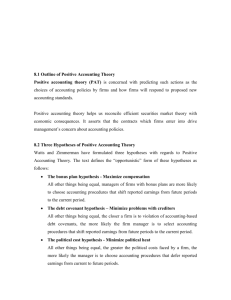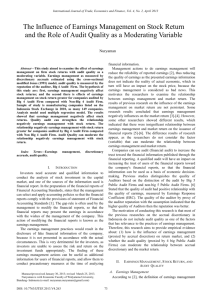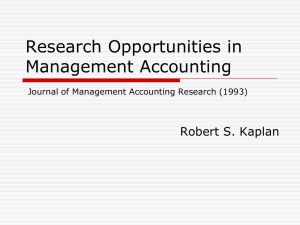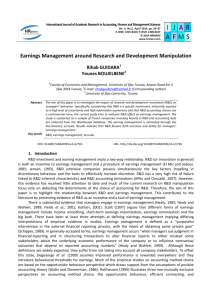Earnings management
advertisement
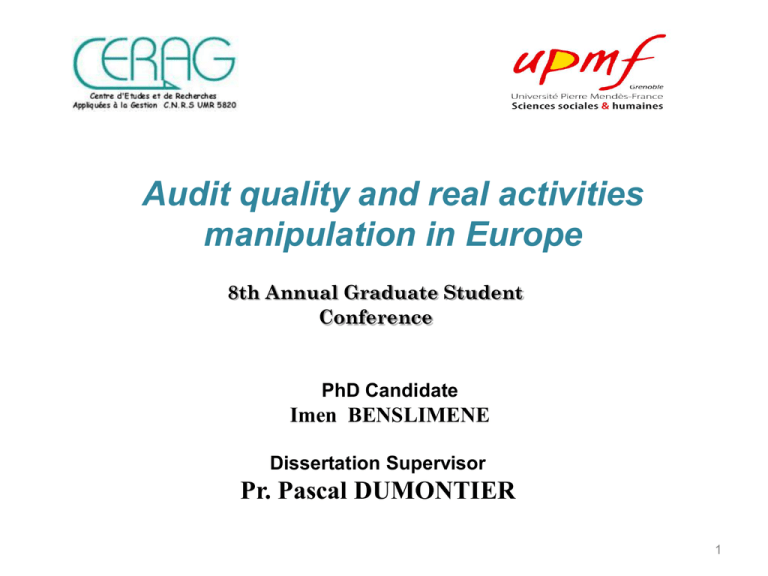
Audit quality and real activities manipulation in Europe 8th Annual Graduate Student Conference PhD Candidate Imen BENSLIMENE Dissertation Supervisor Pr. Pascal DUMONTIER 1 PRESENTATION OUTLINE INTRODUCTION RESEARCH QUESTION RESEARCH OBJECTIVE LITERATURE REVIEW HYPOTHESES RESEARCH DESIGN CONCLUSION 2 INTRODUCTION Information asymmetry Managers Stakeholders Stock price Accounting Numbers Audit Quality Earnings Management 3 Acounting-based earnings management Earnings management Discretionary accruals DeAngelo (1986) ; Jones (1991) ; Dechow et al.(1995) ; Dechow et al. (2003) ;Piot et al.( 2005) And /Or Healy and Whalen, 1999 Real earnings management Real activities manipulation Roychowdhury (2006), Zang (2007) , Gunny ( 2005 – 2009), Cohen et al. ( 2010) 4 RESEARCH QUESTION What is the impact of audit quality on strategy choice for earnings management (accruals and / or real activities manipulation)? 5 RESEARCH OBJECTIVE To investigate whether constraints imposed on accounting-based earnings management by audit quality indirectly increases real activities manipulation in Europe 6 LITERATURE REVIEW Subramanyam et al. (1998 ) Becker et al. (1998) Audit quality and Accounting based earnings management Francis et al. (1999) High quality auditing constrains accounting –based earning management Ehrabim (2001) Mrad (2004) Piot and Janin (2004)/(2008) Ben Othman and Zeghal (2006) High quality auditing does not constrain accounting –based earning management 7 Hypothesis 1 • Clients of high quality auditors engage in less accounting based earnings management 8 LITERATURE REVIEW Graham et al. (2005) Audit quality and real activities manipulation Gunny (2005) Cohen et al. (2007) Accrual constraints exerted by high quality audits can motivate managers to switch to REM Yu ( 2008) 9 Hypothesis 2 • Clients of high quality auditors engage in more real activities manipulation 10 RESEARCH DESIGN Sample • Initial sample consists of all listed firms in original 15 European Union countries Period • 2007 to 2010 Databases • OSIRIS and Thomson Financial 11 Measures of accrual-based earnings management (Modified Jones model) Total accruals ACCT = EBXI – operating CFO Normal accruals ACCND t /TA t-1= 1(1/ TA t-1) + 2 (Δ CA/ TA t-1) +3 (Immob. t/ TA t-1) Discretionary accruals ACCD t = ACCT /TA t-1 – ACCND i 12 Real Activities Manipulation (Roychowdhury, 2006) Sales manipulation Acceleration of the timing of sales through increased price discounts or more lenient credit terms Reduction of discretionary expenses Decreases in discretionary expenses including advertising, R&D, and SG&A expenses Overproduction Reporting of lower cost of goods sold through increased production Abnormal CFO (ab_CFO), (ab_PROD) and (ab_DISX) are computed as the difference between actual values and normal levels Step 3 Normal levels of CFO, discretionary expenses , and production costs (Dechow et al.,1998; Roychowdhury, 2006) Step 2 Step 1 Measures of Real Activities Manipulation (Roychowdhury, 2006) RM combines the three individual measures of RAM 14 AUDIT QUALITY MESURES •Big 4 /N Big 4 •Audit fees •Industry specialization 15 RESEARCH MODEL Institutional factors • Legal attributes (La Porta et al., 1998 , Leuz et al., 2003) • Specific regulation of the national audit market Control • • • • • Size of firm Leverage ROA ABS ACCRUALS MTB EM Audit quality • Audit fees • Industry specialization • Big 4/ N Big 4 H1 AEM REM H2 16 INTEREST OF RESEARCH Analyze the behavior of earnings management in Europe Analyse the role of audit quality on trade off between REM and AM Examine the effects of member state audit environment on one hand and earnings management on the other 17 Research Agenda / Difficulties • Research Agenda Continue running the model Start writing results • Difficulties Database: certain variables are un-available (changed to available variables) 18 THANK YOU FOR YOUR ATTENTION 19

